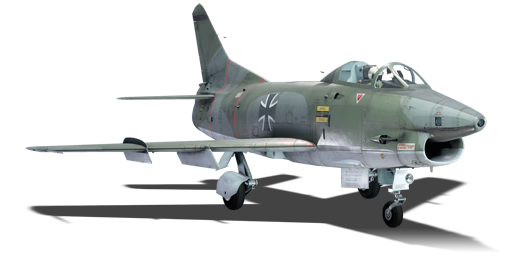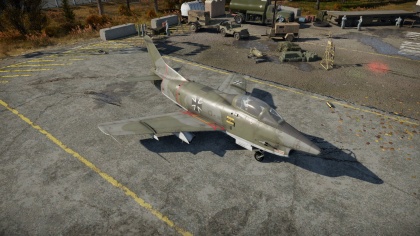G.91 R/3 (Germany)
Contents
| This page is about the German jet fighter G.91 R/3 (Germany). For other uses, see G.91 (Family). |
Description
The ◄G.91 R/3 is a rank VI German jet fighter
with a battle rating of 9.0 (AB/SB) and 8.7 (RB). It was introduced in Update 1.91 "Night Vision".
General info
Flight performance
Describe how the aircraft behaves in the air. Speed, manoeuvrability, acceleration and allowable loads - these are the most important characteristics of the vehicle.
| Characteristics | |||||||
|---|---|---|---|---|---|---|---|
| Stock | |||||||
| Max Speed (km/h at 0 m - at sea level) |
Max altitude (meters) |
Turn time (seconds) |
Rate of climb (meters/second) |
Take-off run (meters) | |||
| AB | RB | AB | RB | AB | RB | ||
| 1065 | 1042 | 11000 | 27.6 | 28.1 | 31.5 | 30 | 850 |
| Upgraded | |||||||
| Max Speed (km/h at 0 m - at sea level) |
Max altitude (meters) |
Turn time (seconds) |
Rate of climb (meters/second) |
Take-off run (meters) | |||
| AB | RB | AB | RB | AB | RB | ||
| 1097 | 1084 | 11000 | 24.6 | 26 | 47.6 | 39 | 850 |
Details
| Features | ||||
|---|---|---|---|---|
| Combat flaps | Take-off flaps | Landing flaps | Air brakes | Arrestor gear |
| ✓ | ✓ | ✓ | ✓ | X |
| Limits | ||||
|---|---|---|---|---|
| Wing-break speed (km/h) |
Gear limit (km/h) |
Combat flaps (km/h) |
Max Static G | |
| + | - | |||
| 620 | ~10 | ~4 | ||
| Optimal velocities | |||
|---|---|---|---|
| Ailerons (km/h) |
Rudder (km/h) |
Elevators (km/h) |
Radiator (km/h) |
| < 800 | < 650 | < 660 | N/A |
| Compressor (RB/SB) | ||
|---|---|---|
| Setting 1 | ||
| Optimal altitude | 100% Engine power | WEP Engine power |
| 0 m | 2,190 kgf | 2,212 kgf |
Survivability and armour
Examine the survivability of the aircraft. Note how vulnerable the structure is and how secure the pilot is, whether the fuel tanks are armoured, etc. Describe the armour, if there is any, and also mention the vulnerability of other critical aircraft systems.
Armaments
Offensive armament
Describe the offensive armament of the aircraft, if any. Describe how effective the cannons and machine guns are in a battle, and also what belts or drums are better to use. If there is no offensive weaponry, delete this subsection.
Suspended armament
Describe the aircraft's suspended armament: additional cannons under the wings, bombs, rockets and torpedoes. This section is especially important for bombers and attackers. If there is no suspended weaponry remove this subsection.
Usage in battles
Describe the tactics of playing in the aircraft, the features of using aircraft in a team and advice on tactics. Refrain from creating a "guide" - do not impose a single point of view, but instead, give the reader food for thought. Examine the most dangerous enemies and give recommendations on fighting them. If necessary, note the specifics of the game in different modes (AB, RB, SB).
Pros and cons
Pros:
- Exceptional manoeuvrability, with very high roll and turn rates
- Effective suspended armament choices for ground strike
- Access to the AS-20 Nord air-to-ground missile that can destroy any tank
- Two 30 mm DEFA cannons available
- Can carry 4 x AS-20 Nord missiles unlike most other jet fighters which only can carry two
- Small burst of 30 mm cannons is enough to fully destroy a plane especially in the head-on situations
- Has access to drag chute, its very effective for losing speed when landing on the small airfields
- The 30 mm cannons have very good penetration can destroy light tanks through the hull and other main battle tanks through the roof
Cons:
- Slower than most of its contemporaries
- Very fragile airframe
- Poor energy retention
- Fairly low ammo count for the guns means that you need to be conservative with your ammo
- Wing snaps off when sharply turning at speeds above 700 kph
History
The G.91 'Small Sabre" entered service with the Luftwaffe in 1962 after winning the 1953 NATO light tactical support aircraft competition. That competition had called for a fighter that could carry 452 kg of ordnance, with a combat radius of 180 km assuming 10 mins over the target, with a cruising speed of at least 705 km/h and Mach 0.95 capability. It also had to be fully operational on grass and unprepared runways, with a take-off distance of 1100m. The R-3 was the Luftwaffe's version, with more powerful armament, two wingpoints and better avionics than the Italian Air Force's R-1s. Fifty R-3s were built in Italy starting in 1959 and another 294 were license-built in West Germany. It also received another 50 of the very similar R-4s after that order for Greece and Turkey fell through. The Luftwaffe also had 66 T-3 two-seat trainer models, 22 of which were built in Germany as well.
Media
Excellent additions to the article would be video guides, screenshots from the game, and photos.
See also
Links to the articles on the War Thunder Wiki that you think will be useful for the reader, for example:
- reference to the series of the aircraft;
- links to approximate analogues of other nations and research trees.
External links
Paste links to sources and external resources, such as:
- topic on the official game forum;
- encyclopedia page on the aircraft;
- other literature.
| Germany jet aircraft | |
|---|---|
| |
Luftwaffe |
| He 162 | He 162 A-1 · He 162 A-2 |
| Me 163 | Me 163 B · Me 163 B-0 |
| Ho 229 | Ho 229 V3 |
| Ar 234 | Ar 234 B-2 · Ar 234 C-3 |
| Me 262 | Me 262 A-1a · Me 262 A-1a/Jabo · Me 262 A-1a/U1 · Me 262 A-1/U4 · Me 262 A-2a |
| Me 262 C-1a · Me 262 C-2b | |
| |
LSK |
| Fighters | ◊MiG-15bis · ◊Lim-5P · ◊MiG-19S |
| ◊MiG-21MF · ◊MiG-21bis-SAU · ◊MiG-21 "Lazur-M" | |
| ◊MiG-29 | |
| Attackers | ◊MiG-23BN · ◊MiG-23MF · ◊MiG-23MLA |
| ◊Su-22UM3K · ◊Su-22M4 | |
| ◊IL-28 | |
| |
Luftwaffe |
| F-84 | ◄F-84F |
| F-86 | ◄CL-13A Mk 5 · ◄CL-13B Mk.6 · ◄F-86K |
| F-104 | ◄F-104G |
| F-4 | ◄F-4F Early · ◄F-4F · ◄F-4F KWS LV |
| G.91 | ◄G.91 R/3 · ◄G.91 R/4 |
| Tornado | ◄Tornado IDS WTD61 · ◄Tornado IDS MFG · ◄Tornado IDS ASSTA1 |
| Other | Alpha Jet A · ◄Sea Hawk Mk.100 |
| Ex-LSK | ◄MiG-21 SPS-K · ◄MiG-29G · ◄Su-22M4 WTD61 |
| |
Swiss Air Force |
| ◌Hunter F.58 · FFA P-16 | |





